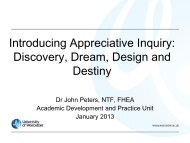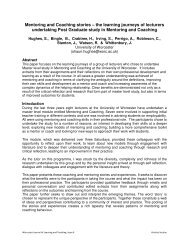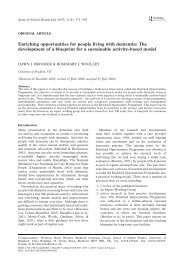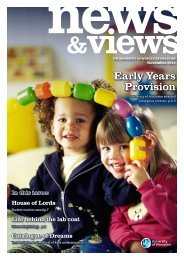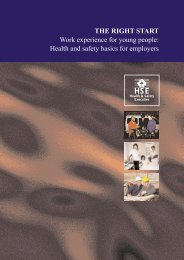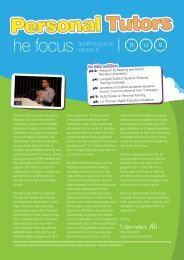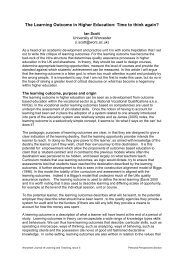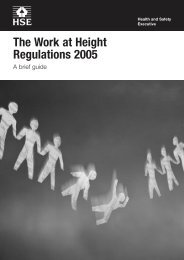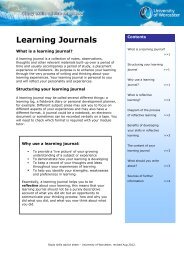Graduate Certificate in Managing Health and Social Care ...
Graduate Certificate in Managing Health and Social Care ...
Graduate Certificate in Managing Health and Social Care ...
Create successful ePaper yourself
Turn your PDF publications into a flip-book with our unique Google optimized e-Paper software.
<strong>Graduate</strong> <strong>Certificate</strong> <strong>in</strong> Manag<strong>in</strong>g <strong>Health</strong> <strong>and</strong> <strong>Social</strong> <strong>Care</strong> : Programme Specification1. Award<strong>in</strong>g Institution/Body University of Worcester2. Teach<strong>in</strong>g Institution University of Worcester <strong>and</strong>BDC (Bus<strong>in</strong>ess Development Consultancy3. Programme Accredited By Recognised for membership of Institute of<strong>Health</strong>care Management4. F<strong>in</strong>al Award <strong>Graduate</strong> <strong>Certificate</strong>5. Programme Title <strong>Graduate</strong> <strong>Certificate</strong> <strong>in</strong> Manag<strong>in</strong>g <strong>Health</strong> &<strong>Social</strong> <strong>Care</strong>6. Pathways Available Not Applicable7. Mode <strong>and</strong>/or site of delivery UW or client, taught modules8. Mode of Attendance Part time over 1 year through monthly oneday workshops supported by blendedlearn<strong>in</strong>g (on-l<strong>in</strong>e study)9. UCAS Code N/A10. Subject Benchmark Statement General Bus<strong>in</strong>ess <strong>and</strong> Management(2007)11. Date of Programme Specification Approved Audit <strong>and</strong> Review CommitteePreparation/ RevisionMay 201212. Educational Aims of the ProgrammeThe <strong>Graduate</strong> <strong>Certificate</strong> <strong>in</strong> Manag<strong>in</strong>g <strong>Health</strong> & <strong>Social</strong> <strong>Care</strong> is a programme designed aroundthe needs of first l<strong>in</strong>e <strong>and</strong> middle managers <strong>in</strong> the health <strong>and</strong> social care professions.The programme is designed for all managers, irrespective of professional or functionalbackground who are:Mov<strong>in</strong>g <strong>in</strong>to management for the first time, or are experienced first-l<strong>in</strong>e managers.First l<strong>in</strong>e / middle managers wish<strong>in</strong>g to develop or consolidate their management skills.Return<strong>in</strong>g to work after a career break.The twelve month programme is offered on a part-time basis <strong>and</strong> is designed to enable studentsto develop practical management skills. The programme aims to provide students with thetheories, tools <strong>and</strong> techniques to manage people <strong>and</strong> services effectively <strong>in</strong> the health <strong>and</strong> socialcare sectors, <strong>and</strong> to help them to make the most efficient use of f<strong>in</strong>ancial resources <strong>and</strong><strong>in</strong>formation. It is designed to improve students’ ability to <strong>in</strong>fluence others <strong>in</strong> order to achieveresults. It focuses on applied learn<strong>in</strong>g, encourag<strong>in</strong>g students to relate new knowledge <strong>and</strong> skillsto real workplace situations. In particular, the purpose of the programme is to provide studentswith:1. A stimulat<strong>in</strong>g academic environment which is based upon the values of academicopenness, critical appraisal <strong>and</strong> sensitivity to diversity <strong>in</strong> terms of people, cultures,leadership, management <strong>and</strong> (health <strong>and</strong> social care) sector issues;2. The basis for further professional development, <strong>in</strong>clud<strong>in</strong>g the ability to takeresponsibility for their own CPD <strong>and</strong> the CPD of those for whom they are responsible;3. The knowledge, underst<strong>and</strong><strong>in</strong>g <strong>and</strong> skills to become more effective <strong>in</strong> theirleadership <strong>and</strong> management roles, <strong>in</strong>clud<strong>in</strong>g ma<strong>in</strong>ta<strong>in</strong><strong>in</strong>g effective work<strong>in</strong>g relationships;4. The capacity to develop <strong>and</strong> apply leadership, management, budgetary <strong>and</strong>communications skills as a basis for meet<strong>in</strong>g quality st<strong>and</strong>ards, improv<strong>in</strong>g servicedelivery <strong>and</strong> enhanc<strong>in</strong>g client care;5. A multidiscipl<strong>in</strong>ary approach to health <strong>and</strong> social care leadership <strong>and</strong> management issuestogether with a critical underst<strong>and</strong><strong>in</strong>g of contemporary issues <strong>in</strong> the sector <strong>and</strong> theleadership <strong>and</strong> management of change;6. The ability to explore their potential, <strong>in</strong>crease their self-awareness <strong>and</strong> self-F<strong>in</strong>al approved version 20 th June 20121
confidence together with a cont<strong>in</strong>u<strong>in</strong>g appetite for reflective, adaptive <strong>and</strong> collaborativelearn<strong>in</strong>g <strong>in</strong> order to support progression opportunities to other programmes such as theMBA <strong>in</strong> Executive Leadership & Management (<strong>Health</strong> <strong>and</strong> <strong>Social</strong> <strong>Care</strong>).13. Intended Learn<strong>in</strong>g Outcomes <strong>and</strong> Learn<strong>in</strong>g, Teach<strong>in</strong>g <strong>and</strong> Assessment MethodsKnowledge <strong>and</strong> underst<strong>and</strong><strong>in</strong>g:Examples of teach<strong>in</strong>g, learn<strong>in</strong>g <strong>and</strong>assessment methods used:The knowledge, skills <strong>and</strong> competencies required for Self-study us<strong>in</strong>g learn<strong>in</strong>g materialsfirst-l<strong>in</strong>e/ middle management positions with<strong>in</strong> health, available via the VLE, supplemented bysocial care <strong>and</strong> voluntary organisations.e-books <strong>and</strong> digitised chapters.The application of critical th<strong>in</strong>k<strong>in</strong>g to the successful A programme of one-day or half-daymanagement of health, social care <strong>and</strong> voluntary<strong>in</strong>teractive workshops, compris<strong>in</strong>g grouporganisations.work sessions.The basis of operational decision mak<strong>in</strong>g, <strong>and</strong> how Peer-learn<strong>in</strong>g sets operat<strong>in</strong>g with<strong>in</strong> thethe drivers of change can <strong>in</strong>fluence policy mak<strong>in</strong>g. context of the organisation.The research<strong>in</strong>g <strong>and</strong> writ<strong>in</strong>g of workbasedassignments <strong>and</strong> subsequent oral<strong>and</strong> written feedbackAssessment by a variety of means<strong>in</strong>clud<strong>in</strong>g critically reflective <strong>and</strong>evaluative pieces, <strong>and</strong> organisationalevidence research-based tasks result<strong>in</strong>g<strong>in</strong> recommendations for improvement<strong>and</strong> implementationCognitive <strong>and</strong> <strong>in</strong>tellectual/ skills:Problem solv<strong>in</strong>g <strong>and</strong> deal<strong>in</strong>g with complex issues ofmanagement <strong>and</strong> leadership.Critical appraisal applied to current areas of themanagement curriculum, <strong>and</strong> to the context of theirwork with<strong>in</strong> their organisation.The development <strong>and</strong> application of a rangeof management techniques <strong>and</strong> toolsappropriate to first-l<strong>in</strong>e <strong>and</strong> middle management <strong>in</strong>the areas of people, resources, operations <strong>and</strong><strong>in</strong>formation.Analysis <strong>and</strong> <strong>in</strong>terpretation of a variety of f<strong>in</strong>ancial<strong>and</strong> non-f<strong>in</strong>ancial data as applied to a range of health<strong>and</strong> social care management situations.Exercis<strong>in</strong>g judgement <strong>and</strong> underst<strong>and</strong><strong>in</strong>g <strong>in</strong> relation toethical issues.Reflect<strong>in</strong>g critically upon own exist<strong>in</strong>g practicePractical skills relevant to employment:Appreciate their own management role with<strong>in</strong> theorganisation <strong>and</strong> be sensitive to the differ<strong>in</strong>gperspectives of others.Identify their personal development needs <strong>and</strong> deviseappropriate action plans.Develop the necessary skills to work effectively with<strong>and</strong> to lead others with<strong>in</strong> health <strong>and</strong> social careorganisations.Plan, manage <strong>and</strong> make sound judgements <strong>in</strong>accordance with the core values of health, social care<strong>and</strong> voluntary organisations.Underst<strong>and</strong> <strong>and</strong> apply approaches to resourceF<strong>in</strong>al approved version 20 th June 2012Examples of teach<strong>in</strong>g, learn<strong>in</strong>g <strong>and</strong>assessment methods used:All modules require learners to engage <strong>in</strong>discussion of key issues <strong>and</strong> theapplication of key conceptsCase study analysis <strong>and</strong> groupdiscussions, offer students theopportunity to engage <strong>in</strong> problem solv<strong>in</strong>g<strong>and</strong> complex issuesBUSM3915 requires analytical skills tobe applied to a variety of dataConsideration of human resourcemanagement <strong>and</strong> service delivery raisesissues <strong>in</strong> which judgement needs to beexercisedIntellectual <strong>and</strong> cognitive skills areassessed by means of a range ofanalytical, evaluative <strong>and</strong> reflectiveassignments.Examples of teach<strong>in</strong>g, learn<strong>in</strong>g <strong>and</strong>assessment methods used:ILS contact runs session dur<strong>in</strong>g <strong>in</strong>ductionrelat<strong>in</strong>g to <strong>in</strong>formation resourcesavailable.Group <strong>and</strong> <strong>in</strong>dividual tasks <strong>in</strong>volv<strong>in</strong>glibrary <strong>and</strong> <strong>in</strong>ternet-based <strong>in</strong>formationretrieval feature <strong>in</strong> various modules.Chat-room facilities enabled through aVLE (Blackboard)Personal Development assessmentforms part of the assessment strategy ofthe course.Project-based tasks <strong>in</strong>volv<strong>in</strong>g group2
management <strong>in</strong> deal<strong>in</strong>g with complex issues.Transferable/key skills:Numeracy <strong>and</strong> quantitative skillsTwo-way communication skills, e.g. negotiation <strong>and</strong>persuasionSelf management skills <strong>and</strong> personal effectiveness,e.g. time managementProfessional developmentEffective use of ICT.activities.Written assignments used to assessanalytical skills.Examples of teach<strong>in</strong>g, learn<strong>in</strong>g <strong>and</strong>assessment methods used:Quantitative skills taught through use ofworked examples, e.g. <strong>in</strong> relation toevaluat<strong>in</strong>g effective budgetary sett<strong>in</strong>g <strong>in</strong>BUSM3915Group exercises <strong>in</strong>volv<strong>in</strong>g role-play areused to develop two-way communicationskillsAdvice on time management skills areconveyed as an <strong>in</strong>tegral element ofsuccessfully complet<strong>in</strong>g assignments.Certa<strong>in</strong> quantitative skills are assessedthrough appropriate formative <strong>and</strong>summative assignments eg BUSM3915An audit of programme learn<strong>in</strong>g outcomes mapped aga<strong>in</strong>st constituent modules is <strong>in</strong>cluded asAppendix A <strong>in</strong> the Course H<strong>and</strong>book.A wide variety of learn<strong>in</strong>g <strong>and</strong> teach<strong>in</strong>g methods embrac<strong>in</strong>g blended learn<strong>in</strong>g have beendesigned for use <strong>in</strong> the modules that comprise the <strong>Graduate</strong> <strong>Certificate</strong> <strong>in</strong> Manag<strong>in</strong>g <strong>Health</strong> &<strong>Social</strong> <strong>Care</strong> programme.Support for students, <strong>in</strong> relation to study skills, takes a variety of forms on the programme. S<strong>in</strong>cestudents will only attend for one day each month, additional support is provided for academicstudy skills <strong>and</strong> assignment skills. For example, guidance on study skills is provided at<strong>in</strong>duction, where students are directed to workshops available through the Students Union, <strong>and</strong>also to on-l<strong>in</strong>e support material from Information <strong>and</strong> Learn<strong>in</strong>g Services. The course materialsthemselves also offer valuable advice around the area of study skills.In develop<strong>in</strong>g the programme, consideration has been given to the follow<strong>in</strong>g strategies: -The use of relevant core texts cover<strong>in</strong>g key elements of the programme, supplemented by avariety of e-books, digitised chapters <strong>and</strong> task-based material via the VLE;Tutorial <strong>and</strong> learn<strong>in</strong>g support provided through half-day <strong>and</strong> full-day workshops by tutors fromWorcester Bus<strong>in</strong>ess School.Peer Learn<strong>in</strong>g Sets, run by the delegates themselves (with <strong>in</strong>itial guidance from tutors), giv<strong>in</strong>gthem an opportunity to;- discuss <strong>and</strong> reflect upon key issues;- apply the learn<strong>in</strong>g achieved to the work-place;- learn from each other <strong>and</strong> provide mutual assistance.Tutor surgeries are available when students need personal support <strong>and</strong> advice.The materials provide a key vehicle for managers both to acquire <strong>and</strong> apply new managementskills <strong>and</strong> knowledge with<strong>in</strong> the context of their own job <strong>and</strong> workplace. The workshops providetutorial guidance <strong>and</strong> support to underp<strong>in</strong> the material <strong>and</strong> assist <strong>in</strong> apply<strong>in</strong>g learn<strong>in</strong>g to practical,work based situations. Each student has an Academic Tutor assigned to them who isresponsible for his/her academic welfare, <strong>and</strong> for support<strong>in</strong>g the student as they reflect uponhow their learn<strong>in</strong>g <strong>in</strong>forms practice. The students are expected to apply their learn<strong>in</strong>g to theworkplace, focus upon changes to their management style <strong>and</strong> behaviour <strong>and</strong> apply successcriteria for their personal development plans. Moreover, the learn<strong>in</strong>g & teach<strong>in</strong>g strategiesemployed provide an effective l<strong>in</strong>k between the consideration of their own personal developmentF<strong>in</strong>al approved version 20 th June 20123
needs <strong>and</strong> the needs of their employers.Participat<strong>in</strong>g Trusts <strong>and</strong> <strong>Care</strong> organisations may provide work-place mentors for the students,who, amongst other th<strong>in</strong>gs, provide support, advice <strong>and</strong> encouragement. These mentors are<strong>in</strong>dividuals who already possess considerable N.H.S. <strong>and</strong> <strong>Social</strong> <strong>Care</strong>-based managerialexperienceThe teach<strong>in</strong>g <strong>and</strong> learn<strong>in</strong>g strategies for <strong>in</strong>dividual modules that have been outl<strong>in</strong>ed <strong>in</strong> thisdocument have been undertaken <strong>in</strong> accordance with the University's Learn<strong>in</strong>g, Teach<strong>in</strong>g <strong>and</strong>Assessment Strategy14. Assessment strategyAs with the Learn<strong>in</strong>g <strong>and</strong> Teach<strong>in</strong>g strategy, outl<strong>in</strong>ed above, the Assessment strategy has beendesigned to provide students with a variety of tasks appropriate for undergraduate level work.The range of assessments specified has been developed <strong>in</strong> order to support the pedagogicalapproaches employed <strong>and</strong> be appropriate for the nature of the subject discipl<strong>in</strong>es covered.Assessment is constructed <strong>in</strong> such a way that a student’s knowledge <strong>and</strong> underst<strong>and</strong><strong>in</strong>g of eachmodule studied dur<strong>in</strong>g the course is assessed <strong>in</strong> a manner most appropriate to allow theachievement of the relevant Intended Learn<strong>in</strong>g Outcomes. Further details of assessment typeby module are conta<strong>in</strong>ed <strong>in</strong> Appendix B of the Course H<strong>and</strong>book.The overall purpose of assessments on this programme is to enable students to:Demonstrate that they have the <strong>in</strong>tellectual rigour commensurate with a course of this nature<strong>and</strong> have developed the analytical skills expected of study at Level 6 (FHEQ).Demonstrate the ability to synthesise appropriate theories, models <strong>and</strong> concepts from arange of modules studied on the course <strong>and</strong> apply them to critically evaluate real worldscenariosGa<strong>in</strong> experience <strong>in</strong> work<strong>in</strong>g <strong>in</strong>dividually <strong>and</strong> as part of a teamMaximise the opportunity to utilise <strong>and</strong> share their own experience(s) <strong>and</strong> studies to produceconcise documents of the k<strong>in</strong>d used <strong>in</strong> the management decision mak<strong>in</strong>g processReceive cont<strong>in</strong>uous, regular <strong>and</strong> appropriate feedback throughout the courseDevelop the <strong>in</strong>tellectual <strong>and</strong> practical abilities required of managersIn test<strong>in</strong>g student underst<strong>and</strong><strong>in</strong>g, great use is made of relevant <strong>and</strong> up to date case studies thatencourage students to apply management theories, models <strong>and</strong> concepts to critically evaluatereal-world situations. Evidence-based research, self-reflection <strong>and</strong> feasibility tasks enable thestudents to undertake assignments that are directly l<strong>in</strong>ked <strong>and</strong> relevant to their organisation <strong>and</strong>role. In this way students are encouraged to use their studies to critically evaluate <strong>and</strong> reflectupon their own organisations <strong>and</strong> their own performance <strong>in</strong> order to be able to make an effectivecontribution towards cont<strong>in</strong>uous organisational improvement as well as their own selfdevelopment.Students are assessed by a comb<strong>in</strong>ation of course work items, of both a formative <strong>and</strong>summative nature. Formative assessment typically requires students to complete tasks <strong>and</strong>activities both <strong>in</strong> <strong>and</strong> between sessions <strong>and</strong> to demonstrate completion of these tasks to thetutor to ensure the development of their knowledge of relevant concepts. Students also havethe opportunity to complete a dry-run for the Personal Development Audit completed as part ofmodule BUSM3914, <strong>in</strong> preparation for f<strong>in</strong>al summative assessment.Students are required to submit assessed work on an <strong>in</strong>dividual basis. They are required towork with other students <strong>and</strong> a wide range of stakeholders from their employ<strong>in</strong>g organisations togather evidence for their <strong>in</strong>dividual submissions (e.g. BUSM3915). Students are also activelyencouraged to discuss their underst<strong>and</strong><strong>in</strong>g of models, concepts <strong>and</strong> theories, <strong>and</strong> moreimportantly their application to a given scenario, with other members of their group. This allowsF<strong>in</strong>al approved version 20 th June 20124
students to share ideas <strong>and</strong> experiences, test their underst<strong>and</strong><strong>in</strong>g, <strong>and</strong> more critically evaluatethe models under discussion. In this way students learn from each other <strong>and</strong> developrelationships that will help them through the rest of their studies.In l<strong>in</strong>e with UW Assessment Policy, assessments are scheduled so that they can be completedon an ongo<strong>in</strong>g basis throughout the academic year. Detailed assessment briefs are given tostudents at the start of a module. Wherever practicable, coursework will be markedanonymously. Mark<strong>in</strong>g of student work is <strong>in</strong>ternally <strong>and</strong> externally verified via a m<strong>in</strong>imum of15% sample of work for every element of assessment. Where there is some doubt as to theauthorship of an assessment, University of Worcester has its own procedures for <strong>in</strong>vestigation ofcases of alleged cheat<strong>in</strong>g.Student work is graded accord<strong>in</strong>g to the University’s Generic Undergraduate Grade Descriptors.The m<strong>in</strong>imum pass grade is D- for each module <strong>in</strong> accordance with the UndergraduateRegulatory Framework. Specific assessment criteria, which reflect the Intended Learn<strong>in</strong>gOutcomes are also published for each assessment.15. Programme structures <strong>and</strong> requirementsThe <strong>Graduate</strong> <strong>Certificate</strong> <strong>in</strong> Manag<strong>in</strong>g <strong>Health</strong> & <strong>Social</strong> <strong>Care</strong> programme is designed to deliver abalanced programme of study <strong>in</strong> which to explore leadership <strong>and</strong> management issues <strong>in</strong> thecontext of the effective leadership <strong>and</strong> management of people <strong>and</strong> viable resourc<strong>in</strong>g ofcustomer-oriented service delivery. Each module has a value of 30 credits <strong>in</strong> order toencourage susta<strong>in</strong>ed <strong>and</strong> deep learn<strong>in</strong>g. The Programme comprises the follow<strong>in</strong>g level 6modules:Award Map (Level 6)Module Module Title Credit Value Module StatusCodeBUSM 3914 Manag<strong>in</strong>g Self <strong>and</strong> Team 30 M<strong>and</strong>atoryBUSM 3915 Manag<strong>in</strong>g Services <strong>and</strong> Resources 30 M<strong>and</strong>atoryStudents who pass BUSM3914 <strong>and</strong> BUSM3915, are eligible for the award of the <strong>Graduate</strong><strong>Certificate</strong> <strong>in</strong> Manag<strong>in</strong>g <strong>Health</strong> & <strong>Social</strong> <strong>Care</strong>, worth 60 credits at level 6 (FHEQ).The programme is structured to enable students to complete the <strong>Graduate</strong> <strong>Certificate</strong> award <strong>in</strong>part time mode over one year.16. QAA Academic InfrastructureThe QAA Subject Benchmark for General Bus<strong>in</strong>ess <strong>and</strong> Management (2007) specifies keyareas of knowledge <strong>and</strong> underst<strong>and</strong><strong>in</strong>g to be covered <strong>in</strong> undergraduate programmes, <strong>and</strong> has<strong>in</strong>formed the assessment strategy for this undergraduate programme. The mapp<strong>in</strong>g exerciseshown <strong>in</strong> Appendix C of the Course H<strong>and</strong>book demonstrates the way <strong>in</strong> which the two modules(BUSM3914 <strong>and</strong> BUSM3915) support the key areas of knowledge <strong>and</strong> underst<strong>and</strong><strong>in</strong>g.The QAA subject benchmark also provides a skill set for undergraduate programmes <strong>and</strong> thesehave been mapped <strong>in</strong> Appendix D of the Course H<strong>and</strong>book to show which modules act tosupport the key subject-specific <strong>and</strong> transferable skills associated with bus<strong>in</strong>ess <strong>and</strong>management.The programme conforms to the requirements set out for undergraduate qualifications by theF<strong>in</strong>al approved version 20 th June 20125
Framework for Higher Education Qualifications (FHEQ). Assessments have been selected thatwill provide students with an opportunity to engage <strong>in</strong> a critical review <strong>and</strong> application oftheoretical tools, techniques <strong>and</strong> ideas relevant to the various aspects of health <strong>and</strong> social caremanagement, <strong>and</strong> applied to an area relevant to a health or social care organisational sett<strong>in</strong>g.The design of the programme has also been <strong>in</strong>formed by <strong>and</strong>, where appropriate, aligned with:The National Occupational St<strong>and</strong>ards for Management <strong>and</strong> Leadership. These outl<strong>in</strong>ethe performance criteria, related skills, knowledge <strong>and</strong> underst<strong>and</strong><strong>in</strong>g required toeffectively carry out various management <strong>and</strong> leadership functions. Appendix E of theCourse H<strong>and</strong>book refers.The NHS Leadership Framework. This provides a consistent approach to leadershipdevelopment for staff <strong>in</strong> health <strong>and</strong> care irrespective of discipl<strong>in</strong>e, role or function, <strong>and</strong>represents the foundation of leadership behaviour throughout the NHS. Appendix F ofthe Course H<strong>and</strong>book refers.The Institute of <strong>Health</strong>care Management’s Eleven Behaviours of Quality Management atmiddle manager level (Level 6). The Eleven Behaviours have been mapped aga<strong>in</strong>st arange of published st<strong>and</strong>ards, <strong>and</strong> are <strong>in</strong>tended to demonstrate a manager’s <strong>in</strong>dividualcompetence <strong>and</strong> fitness for purpose with<strong>in</strong> the ever chang<strong>in</strong>g context of health <strong>and</strong> socialcare. Appendix G of the Course H<strong>and</strong>book refers.17. Support for studentsThroughout the course students will be allocated an Academic Tutor who will:Support academic development <strong>and</strong> progress. This will <strong>in</strong>clude guidance <strong>in</strong> relation toPersonal Development Plann<strong>in</strong>gAct as the first po<strong>in</strong>t of call for any issues or problems aris<strong>in</strong>g whilst at UniversityProvide an official University reference.The follow<strong>in</strong>g resources will also support learn<strong>in</strong>g dur<strong>in</strong>g the course:Bespoke <strong>in</strong>duction programmeCourse h<strong>and</strong>book <strong>and</strong> modules outl<strong>in</strong>es which <strong>in</strong>clude details of the weekly learn<strong>in</strong>gschedule, read<strong>in</strong>g list, assignments etcA dedicated Academic Liaison LibrarianA bespoke VLE (Blackboard) to provide access to learn<strong>in</strong>g materials, exercises <strong>and</strong>discussionsEmail (via student email address) to access Course Leaders, Module Tutors, LibrarianetcStudent representation on Staff Student Consultative Committee (sub-committee ofCourse Management Committee) to address course-wide issues.Students will also have access to support from the University’s central student service <strong>and</strong>resource facilities <strong>in</strong>clud<strong>in</strong>g:Information <strong>and</strong> Learn<strong>in</strong>g Services (ILS) <strong>in</strong>clud<strong>in</strong>g the Student Information Desk <strong>and</strong>Study Skills sheetsStudent Enquiry Desk which acts as a po<strong>in</strong>t of contact for enquiries concern<strong>in</strong>g StudentServices <strong>in</strong>clud<strong>in</strong>g welfare <strong>and</strong> f<strong>in</strong>ancial adviceRegistry Services which provides student-specific <strong>in</strong>formation, <strong>in</strong>clud<strong>in</strong>g module results,on the SOLE page of the University websiteThe Disability & Dyslexia Service which implements codes of practice <strong>in</strong> relation toF<strong>in</strong>al approved version 20 th June 20126
disability <strong>and</strong> racial <strong>and</strong> other forms of discrim<strong>in</strong>ationStudents’ Union18. Admissions policy, criteria <strong>and</strong> proceduresAdmissions Policy for the courseThe <strong>Graduate</strong> <strong>Certificate</strong> <strong>in</strong> Manag<strong>in</strong>g <strong>Health</strong> & <strong>Social</strong> <strong>Care</strong> is a programme designed aroundthe needs of first l<strong>in</strong>e <strong>and</strong> middle managers <strong>in</strong> the health <strong>and</strong> social care professions.The programme is designed for all managers, irrespective of professional, functional specialism,gender or ethnic background who are:1. Mov<strong>in</strong>g <strong>in</strong>to management for the first time, or are experienced first-l<strong>in</strong>e managers.2. First l<strong>in</strong>e / middle managers wish<strong>in</strong>g to develop or consolidate their management skills.3. Return<strong>in</strong>g to work after a career break.Entry requirementsGeneral admissions requirements of the programme are as follows:An HNC, HND, Foundation Degree or equivalent <strong>and</strong> work experience,orRelevant management experience at the appropriate level for the award. Typically, thisshould <strong>in</strong>clude experience of supervis<strong>in</strong>g a team or work<strong>in</strong>g regularly as part of a formalteam structureInternational students hold<strong>in</strong>g an undergraduate qualification recognised by theUniversityStudents whose first language is not English should normally be able to demonstrateproficiency to a m<strong>in</strong>imum level of 6.0 IELTSAdmissions proceduresEntry to the Programme will require all applicants to complete an application form which gives avariety of <strong>in</strong>formation about their work experience, qualifications <strong>and</strong> motivation. These will bechecked by the Programme Manager.Admissions/selection criteriaThe Programme Manager must be satisfied that the applicants are at the appropriate stage <strong>in</strong>their management development to benefit from the Programme <strong>and</strong> be capable of undertak<strong>in</strong>g aprogramme of academic work or offer evidence of academic ability, experience, qualifications<strong>and</strong> motivation.19. Methods for evaluat<strong>in</strong>g <strong>and</strong> improv<strong>in</strong>g the quality <strong>and</strong> st<strong>and</strong>ards of teach<strong>in</strong>g <strong>and</strong>learn<strong>in</strong>gMechanisms for review <strong>and</strong> evaluation of teach<strong>in</strong>g, learn<strong>in</strong>g, assessment, the curriculum <strong>and</strong>outcome st<strong>and</strong>ards, <strong>in</strong>clude:Module feedbackAnnual Evaluation Report completed by Programme ManagerPeriodic review (qu<strong>in</strong>quennial) <strong>in</strong>clud<strong>in</strong>g external scrut<strong>in</strong>yF<strong>in</strong>al approved version 20 th June 20127
Academic peer learn<strong>in</strong>g through observationExternal Exam<strong>in</strong>ers’ reportsAcademic staff annual appraisalFeedback from workplace mentors (where applicable)Committees with responsibility for monitor<strong>in</strong>g <strong>and</strong> evaluat<strong>in</strong>g quality <strong>and</strong> st<strong>and</strong>ardsBus<strong>in</strong>ess School Departmental Quality Assurance CommitteeBus<strong>in</strong>ess School Post Results Moderation GroupCourse Management Committee <strong>and</strong> Staff Student Consultative sub-committee chairedby the Programme Manager, <strong>and</strong> <strong>in</strong>clud<strong>in</strong>g staff <strong>and</strong> student membership to overseeoperation of the course, <strong>and</strong> to meet mid-way through the course <strong>and</strong> at the course-endas part of a programme evaluationUniversity Academic St<strong>and</strong>ards <strong>and</strong> Quality Enhancement CommitteeUniversity Ethics CommitteeUniversity Learn<strong>in</strong>g, Teach<strong>in</strong>g <strong>and</strong> Student Experience CommitteeMechanisms for ga<strong>in</strong><strong>in</strong>g student feedback on the quality of teach<strong>in</strong>g <strong>and</strong> their learn<strong>in</strong>gexperienceModule feedback questionnairesCourse Management Committee <strong>and</strong> Staff Student Consultative sub-committeeMeet<strong>in</strong>gs with Academic TutorMeet<strong>in</strong>gs with mentors/ tra<strong>in</strong><strong>in</strong>g managers (at sponsor<strong>in</strong>g organisations, <strong>and</strong> whereapplicable). It should be noted that organisation-based mentors, whilst stronglyencouraged <strong>and</strong> desirable, are not m<strong>and</strong>atory for the programme. Guidance sessions formentors <strong>and</strong> mentees are <strong>in</strong>tegrated with<strong>in</strong> the programme. Students who are unable tomake arrangements for mentor support will be notified that they must make at least twoappo<strong>in</strong>tments with their Academic Tutor dur<strong>in</strong>g the course of the programme.The Bus<strong>in</strong>ess School has a number of Teach<strong>in</strong>g Fellows with the responsibility of develop<strong>in</strong>g<strong>and</strong> enhanc<strong>in</strong>g the learn<strong>in</strong>g experience of all students with<strong>in</strong> the School.20. Regulation of assessmentRequirements to pass modulesModules are assessed us<strong>in</strong>g a variety of assessment activities which are detailed<strong>in</strong> the module specifications.The m<strong>in</strong>imum pass mark is D- for each module.Students are required to submit all items of assessment <strong>in</strong> order to pass a module,<strong>and</strong> <strong>in</strong> some modules, a pass mark <strong>in</strong> each item of assessment may be required.Full details of the assessment requirements for a module, <strong>in</strong>clud<strong>in</strong>g theassessment criteria, are published <strong>in</strong> the module outl<strong>in</strong>eSubmission of assessment itemsStudents who submit course work late but with<strong>in</strong> 5 days of the due date will havework marked, but the grade will be capped at D- unless an application formitigat<strong>in</strong>g circumstances is accepted.Students who submit work later than 5 days but with<strong>in</strong> 14 days of the due date willnot have work marked unless they have submitted a valid claim of mitigat<strong>in</strong>gcircumstancesStudents who fail to submit an item of assessment lose their right to reassessment<strong>in</strong> that module, <strong>and</strong> will be required to retake the module.For full details of submission regulations see Undergraduate RegulatoryFramework.F<strong>in</strong>al approved version 20 th June 20128
Retrieval of failureStudents are entitled to resit failed assessment items for any module that isawarded a fail grade, unless the failure was due to non-attendance or nonsubmission.Reassessment items that are passed are graded at D-.If a student is unsuccessful <strong>in</strong> the reassessment, they have the right to retake themodule (or, <strong>in</strong> some circumstances, take an alternative module).Requirements for AwardsThe follow<strong>in</strong>g award will be available to students who meet the follow<strong>in</strong>g requirements:Award<strong>Graduate</strong> <strong>Certificate</strong> <strong>in</strong> Manag<strong>in</strong>g<strong>Health</strong> & <strong>Social</strong> <strong>Care</strong>Requirement60 credits at Level 6 (FHEQ)Institute-level Assessment Boards review <strong>and</strong> confirm results for modules, <strong>and</strong> the Board ofExam<strong>in</strong>ers considers students’ mark profiles to make decisions about progression <strong>and</strong>awards as appropriate.21. Indicators of QualityThe University of Worcester underwent a QAA Institutional Audit <strong>in</strong> March 2011. Theaudit confirmed that confidence can be placed <strong>in</strong> the soundness of the <strong>in</strong>stitution’scurrent <strong>and</strong> likely future management of the academic st<strong>and</strong>ards of its awards <strong>and</strong> thequality of the learn<strong>in</strong>g opportunities available to students. The audit team highlightedseveral aspects of good practice, <strong>in</strong>clud<strong>in</strong>g the student academic representative (StARs)<strong>in</strong>itiative, the proactive approach which supports the student experience for disabledstudents, the comprehensiveness of the student onl<strong>in</strong>e environment (SOLE), the widerange of opportunities afforded to students to enhance their employability, the<strong>in</strong>stitution’s commitment to enhancement, <strong>and</strong> the <strong>in</strong>clusive approach to work<strong>in</strong>g with itscollaborative partners.Course satisfaction - The annual National Student Survey 2011 <strong>in</strong>dicated a mean total of3.9 (out of a total of 5) <strong>and</strong> 81% of students agreed that overall they were satisfied withthe Bus<strong>in</strong>ess Management course.Module satisfaction - Student evaluation of Bus<strong>in</strong>ess Management <strong>in</strong>dividual modulesdur<strong>in</strong>g 2010-11 <strong>in</strong>dicated an average satisfaction rat<strong>in</strong>g of 88%Many members of staff engaged <strong>in</strong> develop<strong>in</strong>g the programme are actively engaged <strong>in</strong>relevant research <strong>and</strong> consultancy <strong>in</strong> the discipl<strong>in</strong>es of management <strong>in</strong> a health <strong>and</strong>social care contextThe Annual External Exam<strong>in</strong>ers Report (2011) for the GCMHSC programme particularlycommended the detailed <strong>and</strong> supportive feedback provided to studentsUniversity of Worcester holds the Investors <strong>in</strong> People kitemark which was renewed <strong>in</strong>2011.22. Employability <strong>and</strong> graduate dest<strong>in</strong>ations<strong>Graduate</strong> Dest<strong>in</strong>ationsStudents who successfully complete the <strong>Graduate</strong> <strong>Certificate</strong> <strong>in</strong> Manag<strong>in</strong>g <strong>Health</strong> & <strong>Social</strong> <strong>Care</strong>(GCMHSC) may apply to progress to the MBA <strong>in</strong> Executive Leadership & Management (<strong>Health</strong>F<strong>in</strong>al approved version 20 th June 20129
& <strong>Social</strong> <strong>Care</strong>) award provided they have at least 2 years bus<strong>in</strong>ess/management experience, atan appropriate senior level with<strong>in</strong> the health <strong>and</strong> social care or related sector. Typically thisshould <strong>in</strong>clude responsibility for human, f<strong>in</strong>ancial <strong>and</strong> physical resources <strong>and</strong> implementation ofpolicy/strategy.The GCMHSC qualification can also lead to further development opportunities with universities<strong>and</strong> professional management associations. For example GCMHSC graduates with 2 yearshealthcare management experience will be eligible to jo<strong>in</strong> the Institute of <strong>Health</strong>careManagement as full members.Student EmployabilityIn l<strong>in</strong>e with the Framework for Higher Education Qualifications (August 2008), the GCMHSCprovides students with the follow<strong>in</strong>g qualities <strong>and</strong> transferable skills necessary foremployment:the exercise of <strong>in</strong>itiative <strong>and</strong> personal responsibilitydecision-mak<strong>in</strong>g <strong>in</strong> complex <strong>and</strong> unpredictable contextsthe learn<strong>in</strong>g ability needed to undertake appropriate further tra<strong>in</strong><strong>in</strong>g of a professional orequivalent nature.In addition to the above, Worcester Bus<strong>in</strong>ess School has developed a set of EmployabilitySt<strong>and</strong>ards <strong>in</strong> consultation with employers. Details of how the course provides opportunities fordevelopment <strong>in</strong> each of the relevant Employability St<strong>and</strong>ards are <strong>in</strong>cluded <strong>in</strong> both the ModuleSpecification details <strong>and</strong> the Course H<strong>and</strong>book.The <strong>Care</strong>ers Dest<strong>in</strong>ation Survey 2011 <strong>in</strong>dicated that 95% of the GCMHSC graduates were <strong>in</strong>employment six months after graduat<strong>in</strong>g.L<strong>in</strong>ks with EmployersThis course has been designed based on experience of work<strong>in</strong>g closely with health <strong>and</strong> socialcare practitioners <strong>and</strong> providers. Assignments are based around ‘live’ tasks l<strong>in</strong>ked to thestudent’s own workplace <strong>and</strong> role, thus replicat<strong>in</strong>g the tasks <strong>and</strong> skills which will be encountered<strong>in</strong> employment. Additional contact with employers will be ma<strong>in</strong>ta<strong>in</strong>ed by, for example, <strong>in</strong>vit<strong>in</strong>gguest speakers to address students <strong>and</strong> possibly with workplace mentors.Additionally:Worcester Bus<strong>in</strong>ess School has a Director of Bus<strong>in</strong>ess Development, Bus<strong>in</strong>essDevelopment Manager, a Work Placement Co-ord<strong>in</strong>ator, <strong>and</strong> dedicated adm<strong>in</strong>istrativestaff to promote closer l<strong>in</strong>ks with employers. These, together with the ProgrammeManager for the <strong>Graduate</strong> <strong>Certificate</strong> <strong>in</strong> Manag<strong>in</strong>g <strong>Health</strong> & <strong>Social</strong> <strong>Care</strong> will beresponsible for external liaison.The School has strong work<strong>in</strong>g relationships with a variety of <strong>Health</strong> <strong>and</strong> <strong>Social</strong> <strong>Care</strong>organisations, <strong>in</strong>clud<strong>in</strong>g, Worcestershire Acute Hospitals NHS Trust, Birm<strong>in</strong>gham <strong>and</strong>Solihull Mental <strong>Health</strong> Trust, S<strong>and</strong>well Authority, Herefordshire Council <strong>and</strong>Worcestershire County Council. Through the University’s Institute of <strong>Health</strong> <strong>and</strong> Society,the University has strong l<strong>in</strong>ks with a number of private organisations e.g. BUPASouthbank Hospital, Worcester. These organisations have members drawn from the IHMwhich recognises the award presented here.The Bus<strong>in</strong>ess School’s specialist research centre, the Centre for People @ Work, has awide range of projects <strong>and</strong> opportunities to provide l<strong>in</strong>ks with employers.University of Worcester <strong>Care</strong>ers Advisory Service provides on-go<strong>in</strong>g support for studentsPeriodic <strong>Care</strong>er Fairs are organised by Student Services.F<strong>in</strong>al approved version 20 th June 201210
Please note: This specification provides a concise summary of the ma<strong>in</strong> features of theprogramme <strong>and</strong> the learn<strong>in</strong>g outcomes that a typical student might reasonably be expected toachieve <strong>and</strong> demonstrate if she/he takes full advantage of the learn<strong>in</strong>g opportunities that areprovided. More detailed <strong>in</strong>formation can be found <strong>in</strong> the Course H<strong>and</strong>book <strong>and</strong> module guides.The accuracy of the <strong>in</strong>formation conta<strong>in</strong>ed <strong>in</strong> this document is reviewed by the University ofWorcester <strong>and</strong> may be checked by the Quality Assurance Agency for Higher Education or otherappropriate bodies.Key sources of <strong>in</strong>formation about this course can be found <strong>in</strong>:Student Course H<strong>and</strong>bookUndergraduate Regulatory FrameworkUniversity of Worcester UG Student H<strong>and</strong>bookFurther <strong>in</strong>formation can be found on the University's website at: www.worcester.ac.ukF<strong>in</strong>al approved version 20 th June 201211



